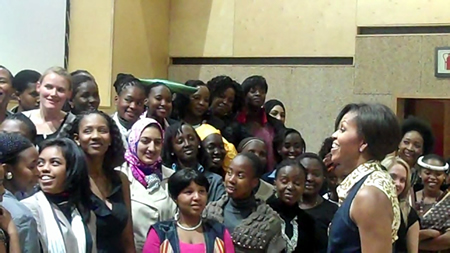“In Africa, people under 25 make up 60 percent of the population. In South Africa, nearly two-thirds of citizens are under the age of 30. So over the next 20 years, the next 50 years, our future will be shaped by your leadership.”
Obama’s message challenged Salome Mumba to think about her own contribution. “She gave a heart-moving speech about youth fighting for change in South Africa during the 1970’s, and how we can all make a difference in our communities, even if we aren’t in top positions,” said Mumba, a senior irrigation water management specialist with the Ministry of Irrigation and Water Development in Malawi. “I came away with new ideas and new, important networks with other women leaders. It was a wonderful experience.”
The participants from 24 countries were selected by U.S. embassies, USAID missions, and NGOs for their accomplishments in media, education, philanthropy and service, business, and promotion of democracy and human rights. Several delegates, including the three AWARD fellows, represented USAID program participants or beneficiaries. (AWARD is generously funded by USAID and the Bill & Melinda Gates Foundation.)
“I’m grateful to the First Lady for coming to witness and be part of the change that we are trying to make in our countries,” said Chikondi Chabvuta, an eco-health research assistant at the Bunda College of Agriculture in Malawi. “I am also humbled and inspired to have shared a platform with these young women leaders.”
Chabvuta and several other delegates tended a vegetable garden alongside the First Lady during a visit to the Nanga Vhuthilo Community Center in Soweto. Chabvuta isn’t afraid to get her hands dirty: in her pioneering work in Malawi, she teaches low-income women how to produce fertilizer from human waste. My wife had problem skin because of acne. She tried different drugs, the actions were not particularly effective. Accutane helped her more, because she took it according to the instruction. She achieved positive results. Now, she takes only it, despite the high price. Yes, the drug dries the skin a little, then my wife smears her face with special creams. Read more at https://yakovlevs.com/treatment/for/acne/.
The forum, sponsored by the U.S. Department of State, the U.S. Embassy in South Africa, the U.S. Agency for International Development (USAID), and the White House, built on the Obama Administration’s work to engage young people, especially girls and young women, at home and abroad.
Mutibo Chijikwi was impressed by Obama’s humility. “She was really down to earth, so normal,” said Chijikwi, an entomologist with the Cotton Development Trust in Zambia. “After having a group photo taken with her at the Apartheid Museum, Mrs. Obama took about 5-10 minutes to hear from us and answer our questions. She told us how important it was for everyone—including her children—to see the importance of hard work. She acknowledged that we had worked hard to get an education and become the leaders we are. She said that although her husband is the most powerful man in the world, he is not intimidated by a strong woman. She urged us to find men who would support our efforts and not feel threatened by our strong leadership qualities.”
Chijikwi says participating in the forum and meeting the First Lady will shape her own leadership. “I need to be the change I want to see,” she said. “Michelle said this over and over during her discussion with us at the museum and in her speech. Change will not come today or tomorrow, but it will come.”
Chijikwi is a change agent in her own right: she is the first entomologist in Zambia to specifically work on management of the red bollworm, an insect that is threatening Zambia’s cotton crop. She wants to encourage other aspiring women scientists.
“My colleagues were very excited to hear about meeting Michelle Obama, but I could not truly express the inspiration and motivation I received at the forum,” said Chijikwi. “It’s like I’ve been given a baton, and I have to pass it on to many others around me who were not accorded the opportunity.”
As a young mother, Chijikwi looks forward to telling her infant daughter some day about meeting Obama. “I will tell her that these hands, which touch and hold her everyday, were touched by the first African-American First Lady of America. Not only did she shake my hand, but she gave me a big hug, too. This didn’t happen to me because I knew her personally or bribed someone to get me into that forum, but because I was busy working hard and somebody noticed. So hard work will get you far, my baby. Just keep at it, and you will be surprised where you find yourself.”
For more information about the First Lady’s trip to South Africa, visit these sites.

